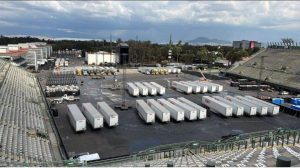America’s sweetheart Taylor Swift is a global phenomenon, having seen enormous success with her evolution from contemporary country to pop princess, producing 15 albums in 18 years and garnering 52 Grammy nominations and 14 wins.
Currently, Ms. Swift is on her sixth concert tour, known as the Eras Tour, which encompasses 152 shows across five continents. To date, it has grossed over $1 billion, making it the highest-grossing tour in history and the first to surpass the 10-digit threshold.
What does it take to move a musical phenomenon between multiple countries?

Fifty-one trucks and drivers, multiple security personnel and a team of dispatchers, planners, operation managers and directors, said Leah Parrott, senior manager of marketing and communications with CFI, a mid-sized trucking company based out of Joplin, Missouri, which hauled the equipment for Ms. Swift’s Mexico City, Mexico, concerts.
“It took a lot of collaboration and teamwork across the operations team specifically,” she said. “All of the leadership team really worked together as well to make sure that we had what we needed to make it happen.”
CFI is a subsidiary of Heartland Express, a trucking company based in North Liberty. Heartland Express acquired CFI in 2022 for $525 million, considered its largest acquisition to date.
Ms. Swift’s production company contacted CFI in early summer 2023 specifically for the transportation of equipment to Mexico City – where she would perform four concerts, starting Aug. 24, 2023 – Ms. Parrott said, because the trucking company specializes in cross-border freight and partnerships with C-TPAT carriers.
Customs Trade Partnership Against Terrorism, or C-TPAT, is a program freight carriers can become certified through that provides reinforced security. Certified carriers are considered low-risk and as such, border crossings can be expedited.
“The C-TPAT certification ensures that we have a higher standard of security on all the freight that we move across the border. So it’s kind of that stamp of approval,” said Ms. Parrott. Not all carriers see the benefits because cross-border shipments are a time-consuming process.
“CFI has been in cross-border transportation for over 35 years now,” said Ms. Parrott. “We’re coming up on 40 years as one of the longest standing cross-border transportation companies between the United States and Mexico that continues to have a strong positive reputation.”
Typically, the trucking company hauls both dry and refrigerated goods, but the request to move concert equipment was not entirely a surprise – CFI has moved concert freight for the Jonas Brothers and other prominent musicians, Ms. Parrot said.
The trucking company coordinates with the production team to meet in a main location within the states and consolidate all the freight before embarking across the border.
“Anything and everything you can think of” in regards to concert equipment is loaded onto the trucks, said Ms. Parrott. “Lights, stage pieces, wardrobe, fog machines, you name it. The list goes on and on.”
Hauling freight for a major production takes three things, she said – long-lasting relationships, an understanding of the freight being carried, and the ability to follow through.
“When you have that many trucks in and out of the stadium with equipment, it’s going to take a lot of coordination and trust and commitment. And just partnerships, just trust across the border,” said Ms. Parrott, adding that the same applies internally at the company as well. Part of building that trust meant keeping whom they were driving for a secret, she said.
It took one month for CFI to ship everything successfully to Mexico City – a long time, but not as long as Ms. Swift’s U.S. leg of the tour, on which the drivers were away for 24 weeks.
In August 2023, Ms. Swift made headlines when she awarded $100,000 bonuses to the drivers of Shomotion, a Colorado-based trucking company that was one of two carriers Ms. Swift used for the U.S. leg of the Eras Tour.
While the CFI drivers did not receive any such bonus from Ms. Swift, Ms. Parrott said their drivers seemed to enjoy the experience overall.
“I think it’s the camaraderie, the ability to say, ‘well, that was a huge job, and we pulled it off,'” she said. “It took across operations, up and down the chain of support and across the company, to really ensure that everything was executed the way he used to be. And that takes a lot of communication, a lot of proactiveness, a lot of willingness to compromise…it takes a lot of teamwork.”